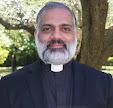Clear Vision, Mission, Planner for Personal Life
(The Lantern, January 2013)
Corporate world sets
up Vision and Mission for its successful growth. Do the individuals take pain
to set up something of this sort? For an integral growth, a Christian is to
manage the three fold relationship: with God, others and oneself. For a sane life,
one is to balance his body, mind and soul. Is it important to have a vision for
life in this world of management? Once a blind man asked to a wise man: can
there be anything worse than losing your eye sight? The wise man replied: yes;
losing your vision. In His teachings, Jesus emphatically mentioned that his
disciples should have a vision and mission to succeed. The one building a tower
and the king going to encounter another king in war need to have clear vision
and planning (Lk 14:27-33). Without counting the cost and paying the price, one
cannot succeed.
Vision for Life
Vision is about having
clarity of the goal that is to be attained. It is a reality to be which is not
yet. A state of what ought to be from what it is. If one wants to achieve
something, the personal vision provides
clarity and gives a sense of purpose and it remains as an internal drive that motivates
to go ahead. It defines who you are and
how you will live. Hence each individual is to make a vision.
Mission (Plan
of Action):
If vision is a dream or an ideal, mission is linked to
specific activities suggesting practical methods of achieving the vision. Mission
is the rationale for actualizing the vision systematically and strategically. Mission
clarifies the distinctive identity, policies and priorities. Human mind raises
basic questions such as what am I, why I am here, what should I do, etc. A
well-formed mission will make clear what should be done and what not be done.
Planner:
In the market, many more things are available than
what we consume daily. One cannot do or have all what is available today. We
know to choose. St. Paul says: All things are lawful for me, but not all things
are helpful (1 Cor 6:12). It is the planner
that answers when and how of the vision and mission. Failing to plan is planning to fail. Planning is an attempt from
now to then; to change things that ought to be changed. Keep in mind that the
planner is to be SMART (Specific, Measurable, Achievable, Realistic
and Time-bound). Planner can be short term and long term. Long
term planning is on a quite a long stretch of future time (one to ten
years) whereas short term planning is for a period of less than a year.
How to work
out?
Vision statement can be about life, career,
relationships, etc. E.g. I would like to be a loving and caring person in the
family, responsible Christian and a successful business man, etc. “Love,
Responsibility, Success” could be my vision statement. In order to attain this vision, I need to have
mission targets. E.g. (1) Love my family members rather than criticizing and
being angry; (2) be interested in caring and helping others than being selfish;
(3) Daily prayer and Bible Reading, observance of commandments will be given priority
than entertainments; (4) The values of hard work, sincerity and honesty will be
upheld; (5) Customer friendly attitude and order will be maintained; etc. Naturally,
there can be more specific and target oriented mission statements. After setting up a vision and mission
statement, one needs to make a period wise planner for a year and a daily time
table. Retrospection and examination will surely help us to understand how far
we improve.
Advice
It sometimes gives an impression that vision, mission
and planner make us to be narrow minded and stiff. Some of us might question
ourselves about the role of the Holy Spirit who leads and the inspiration God
gives. For clarifying the vision and mission one should be guided by the Holy
Spirit. At the same time, one needs to keep in mind that flexibility is a
higher value than the narrow mindedness. If the life is taking us to a totally different
direction than our vision and mission, we need be humble before the Lord and
accept the Lord’s ways which are surely better than man’s.
Fr. Francis
Eluvathingal
